|
|
|
Sort Order |
|
|
|
Items / Page
|
|
|
|
|
|
|
| Srl | Item |
| 1 |
ID:
147100


|
|
|
|
|
| Summary/Abstract |
The United States has the best military in the world today, by far. U.S. forces have few, if any, weaknesses, and in many areas—from naval warfare to precision-strike capabilities, to airpower, to intelligence and reconnaissance, to special operations—they play in a totally different league from the militaries of other countries. Nor is this situation likely to change anytime soon, as U.S. defense spending [2] is almost three times as large as that of the United States’ closest competitor, China [3], and accounts for about one-third of all global military expenditures—with another third coming from U.S. allies and partners.
|
|
|
|
|
|
|
|
|
|
|
|
|
|
|
|
| 2 |
ID:
147111
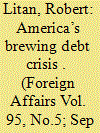

|
|
|
|
|
| Summary/Abstract |
Almost as soon as the financial crisis struck in late 2007, policymakers began working to prevent another one. The roots [1] of the crisis, they contended, lay in reckless lending [2] and excess debt. Banks had made massive loans to “subprime” borrowers, who had little ability to repay them, and the banks funded these investments with borrowed money. When the U.S. housing bubble burst, millions of Americans defaulted on their mortgages, and the overleveraged banks collapsed. The government had to bail them out [3], and U.S. taxpayers picked up the bill.
|
|
|
|
|
|
|
|
|
|
|
|
|
|
|
|
| 3 |
ID:
147104
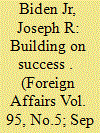

|
|
|
|
|
| Summary/Abstract |
The next administration will take the reins of American foreign policy in a world that is more complex than at any point in our modern history, including the twilight of the Cold War and the years that followed the 9/11 attacks. But it is also the case that despite the proliferation of threats and challenges—some old, some new—by almost any measure, we are stronger and more secure today than when President Barack Obama and I took office [1] in January 2009. Because of our investments at home and engagement overseas, the United States is primed to remain the world’s preeminent power for decades to come. In more than 40 years of public service, I have never been more optimistic about America’s future—if only we continue to lead.
|
|
|
|
|
|
|
|
|
|
|
|
|
|
|
|
| 4 |
ID:
147106
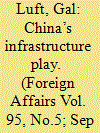

|
|
|
|
|
| Summary/Abstract |
Over the past three millennia, China has made three attempts to project its economic power westward. The first began in the second century BC, during the Han dynasty, when China’s imperial rulers developed the ancient Silk Road to trade with the far-off residents of Central Asia and the Mediterranean basin; the fall of the Mongol empire and the rise of European maritime trading eventually rendered that route obsolete. In the fifteenth century AD, the maritime expeditions of Admiral Zheng He [1] connected Ming-dynasty China [2] to the littoral states of the Indian Ocean. But China’s rulers recalled Zheng’s fleet less than three decades after it set out, and for the rest of imperial history, they devoted most of their attention to China’s neighbors to the east and south.
|
|
|
|
|
|
|
|
|
|
|
|
|
|
|
|
| 5 |
ID:
147103
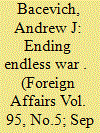

|
|
|
|
|
| Summary/Abstract |
During the Cold War, the United States preferred to husband, rather than expend, its military power. The idea was not to fight but to defend, deter, and contain, a cold peace infinitely preferable to nuclear cataclysm. When U.S. policymakers strayed from this principle, attempting to unify the Korean Peninsula in 1950 [1] or deploying combat troops to Vietnam in the 1960s [2], the results proved unhappy in the extreme.
|
|
|
|
|
|
|
|
|
|
|
|
|
|
|
|
| 6 |
ID:
147105


|
|
|
|
|
| Summary/Abstract |
Ennahda, one of the most influential political parties in the Arab world and a major force in Tunisia’s [1] emergence as a democracy, recentlyannounced [2] a historic transition. Ennahda [3] has moved beyond its origins as an Islamist party and has fully embraced a new identity as a party of Muslim democrats. The organization, which I co-founded in the 1980s, is no longer both a political party and a social movement. It has ended all of its cultural and religious activities and now focuses only on politics.
|
|
|
|
|
|
|
|
|
|
|
|
|
|
|
|
| 7 |
ID:
147110


|
|
|
|
|
| Summary/Abstract |
Brazil has rarely had it so bad. The country’s economy has col¬lapsed: since 2013, its unemployment rate has nearly doubled, to more than 11 percent, and last year its GDP shrank by 3.8 per¬cent, the largest contraction in a quarter century. Petrobras, Brazil’s semipublic oil giant, has lost around 85 percent of its value since 2008, thanks to declining commodity prices [3] and its role in a massive corruption scandal. The Zika virus has infected thousands of Brazilians, exposing the frailty of the country’s health system. And despite the billions of dollars Brasília poured into the 2014 World Cup and this year’s Olympic Games [4], those events have done little to improve the national mood or upgrade the country’s urban infrastructure. Meanwhile, many of Brazil’s long-standing problems have proved stubbornly persistent: half of all Brazilians still lack access to basic sanitation, 35 million of them lack access to clean water, and in 2014, the country suffered nearly 60,000 homicides.
|
|
|
|
|
|
|
|
|
|
|
|
|
|
|
|
| 8 |
ID:
147108
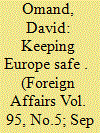

|
|
|
|
|
| Summary/Abstract |
Just before 11 PM on Thursday, July 14, a 19-ton truck turned onto a seaside promenade in Nice, France, where crowds had gathered to watch Bastille Day fireworks. The truck sped up, plowing into the people on the promenade. By the time French police shot the driver, the truck had traveled 1.1 miles, killing 84 people [1] and injuring hundreds more. That attack came less than four months after three terrorists killed 32 people in explosions in the departure hall of Brussels Airport [2] and a metro car near Brussels’ Maelbeek subway station. And it came eight months [3] after a group of young men killed 130 people in Paris, in the deadliest attack on France since World War II. The self-proclaimed Islamic State, or ISIS, claimed responsibility for all three attacks.
|
|
|
|
|
|
|
|
|
|
|
|
|
|
|
|
| 9 |
ID:
147107
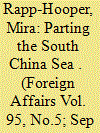

|
|
|
|
|
| Summary/Abstract |
July 12, 2016, marked a turning point in the long-standing disputes over the South China Sea. After more than three years of proceedings at the Permanent Court of Arbitration, an international body in The Hague, a tribunal constituted under the UN Convention on the Law of the Sea (UNCLOS) issued a widely anticipated decision in a case the Philippines brought in 2013 to challenge China’s maritime claims [2] to most of the contested waterway
|
|
|
|
|
|
|
|
|
|
|
|
|
|
|
|
| 10 |
ID:
147102
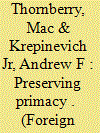

|
|
|
|
|
| Summary/Abstract |
The next U.S. president will inherit [1] a security environment in which the United States con¬fronts mounting threats with increasingly constrained resources, diminished stature, and growing uncertainty both at home and abroad over its willingness to protect its friends and its interests. Revisionist powers in Europe [2], the western Pacific [3], and the Persian Gulf [4]—three regions long considered by both Democratic and Republican administrations to be vital to U.S. national security—are seeking to overturn the rules-based international order. In Europe, Russian President Vladimir Putin has seized Crimea [5], waged proxy warfare in eastern Ukraine [6], and threatened NATO allies on Russia’s periphery. Further demonstrating its newfound assertiveness, Russia has dispatched forces to Syria and strength-ened its nuclear arsenal. After a failed attempt to “reset” relations with Moscow, U.S. President Barack Obama has issued stern warnings andimposed economic sanctions [7], but these have done little to deter Putin.
|
|
|
|
|
|
|
|
|
|
|
|
|
|
|
|
| 11 |
ID:
147101


|
|
|
|
|
| Summary/Abstract |
Four months into his presidency, at a summit in Prague, Barack Obama pledged to take [2] “concrete steps toward a world without nuclear weapons.” Yet nearly eight years later, he presides over a program to modernize the entire U.S. nuclear arsenal at a cost of $35 billion a year through the next decade and beyond. To those who accuse him of hypocrisy [3], Obama has said that he always regarded a nuclear-free world as a long-term goal, unlikely to be met in his lifetime, much less his time in office—and that his modernization program is designed not to build more or more deadly nuclear weapons but rather to maintain and secure the arsenal the United States has now.
|
|
|
|
|
|
|
|
|
|
|
|
|
|
|
|
| 12 |
ID:
147109
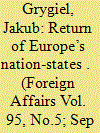

|
|
|
|
|
| Summary/Abstract |
Europe currently finds itself in the throes of its worst political crisis [1] since World War II. Across the continent, traditional political parties have lost their appeal as populist, Euroskeptical movements have attracted widespread support. Hopes for European unity seem to grow dimmer by the day. The euro crisis [2] has exposed deep fault lines between Germany and debt-ridden southern European states [3], including Greece and Portugal. Germany and Italy have clashed on issues such as border controls and banking regulations. And on June 23, the United Kingdom became the first country in history to vote to leave the EU—a stunning blow to the bloc.
|
|
|
|
|
|
|
|
|
|
|
|
|
|
|
|
| 13 |
ID:
147112


|
|
|
|
|
| Summary/Abstract |
It has been more than seven years since U.S. President Barack Obama [1] issued Executive Order 13491 [2], banning the U.S. government’s use of torture. Obama’s directive was a powerful rebuke to the Bush administration, which had, in the years after the 9/11 attacks, authorized the CIA and the U.S. military to use “enhanced interrogation tech¬niques” in questioning suspected terrorists. Some detainees were shackled in painful positions, locked in boxes the size of coffins, kept awake for over 100 hours at a time, and forced to inhale water in a process known as water¬boarding. Interrogators sometimes went far beyond what Washington had authorized, sodomizing detainees with blunt objects, threatening to sexually abuse their family members, and, on at least one occasion, freezing a suspect to death by chaining him to an ice-cold floor overnight.
|
|
|
|
|
|
|
|
|
|
|
|
|
|
|
|
| 14 |
ID:
147113
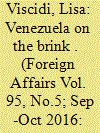

|
|
|
|
|
| Summary/Abstract |
Venezuela is in the throes of its most tumultuous political and economic period [1] in decades. The collapse of global energy prices has wreaked havoc on the country’s economy. Estimates vary, but oil production has fallen from a peak of around 3.2 million barrels per day in 1997 to somewhere between 2.2 million and 2.5 million barrels per day today. Oil and gas account for more than 95 percent of Venezuela’s revenues from exports, and the country produces few other goods. Without the money it makes from exporting energy products, Venezuela[2] has struggled to import everything else its people need. As a result, Venezuelans are facing widespread shortages of food, medicine, and other basic supplies. Citizens wait in line for hours at supermarkets to buy staples such as rice; many have resorted to sifting through trash to find food. Military forces have been dispatched to oversee food production and distribution. Last year, a group of Venezuelan researchers estimated that, in contrast to relatively rosy official statistics, more than three-quarters of Venezuelans are living in poverty. And there is no relief in sight: by the end of the year, the economy will probably have contracted by eight percent and the inflation rate will likely reach 720 percent [3], according to the International Monetary Fund.
|
|
|
|
|
|
|
|
|
|
|
|
|
|
|
|
|
|
|
|
|